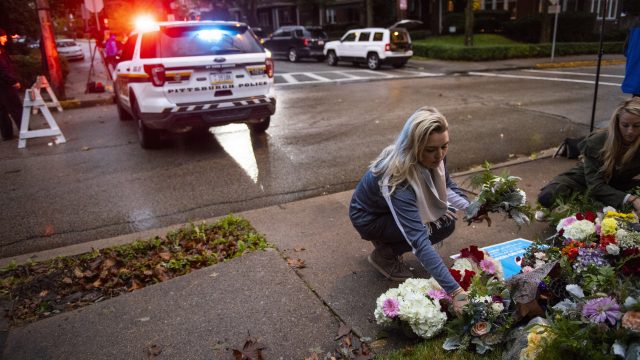The Politics of Identity Play a Role in Inspiring Violence

Adrienne Wager, left, and Shannon Haldeman place flowers near the Tree of Life Congregation, a day after 11 people died at the synagogue during a shooting rampage, in Pittsburgh, Oct. 28, 2018. Authorities on Sunday identified the 11 victims of the shooting in which a man armed with an AR-15-style assault rifle and three handguns shot into a morning worship service in the deadliest attack against the Jewish community in the United States in decades. (Michael Henninger/The New York Times)
The first thing we Americans do these days when confronted with breaking news about some awful situation, most recently the shooting at the synagogue in Pittsburgh or the pipe bombs mailed to left-of-center political figures around the country, is try to figure out which tribe the perpetrator belongs to.
Are they Muslim? Or a Trump supporter? A Bernie Sanders campaign volunteer? A card carrying member of the NRA?
We have to establish this so that we can assess the usefulness of this particular act as a talking point in the infinite left-right political food fight.
It’s a disgusting side effect of what we usually call “identity politics.”
[mks_pullquote align=”right” width=”300″ size=”24″ bg_color=”#ffffff” txt_color=”#000000″]We often talk about the perpetrators of mayhem as if the tribe they associated themselves with were the most important thing about them. So much so that when an obvious tribal affiliation is missing, we impose one anyway.[/mks_pullquote]
That term is usually invoked with regard to race, on the assumption that your skin color or gender or sexual orientation is meaningful to determining who you are as a person, but in a broader sense identity politics is about grouping people together for the sake of political expediency.
We do it so often it’s become rote. Expected.
There are a couple of side effects to this cynical gamesmanship, and neither are great.
First, focusing on tribe obscures the individual. Identity politics makes assumptions about people based on which group they belong to. A black man might be assumed to have been raised in an inner city neighborhood by a single mother. A white might be assumed to have had a privileged upbringing in an affluent, bucolic suburban neighborhood.
These assumptions aren’t helpful, nor are they helpful when we’re talking about the specific perpetrators of crime. We often talk about the perpetrators of mayhem as if the tribe they associated themselves with were the most important thing about them. So much so that when an obvious tribal affiliation is missing, we impose one anyway.
Think of Jared Loughner, who shot former Congresswoman Gabbie Giffords in Tucson. There was an assumption, based mostly on Giffords’ political affiliation, that Loughner was motivated by partisan politics. In truth, it was deep seated mental illness.
Loughner wasn’t even competent to stand trial until he was forced onto a regime of anti-psychotic medications. Yet in the immediate aftermath of his crime some were trying to put the blame on Sarah Palin and the tea party movement.
The right does this too. Remember when some tried to pin the Las Vegas shooting on ISIS?
Second, by weaving each new incident into the various political narratives of the moment, I’m afraid we encourage more of them. We elevate these attacks into a sort of medium for the disaffected. We’ve all but guaranteed that any malcontent, any overwrought nut considering violence, can use murder (or at least an attempt at it) to launch themselves into a news cycle.
That can be attractive to a certain type of crank.
We’ve got to stop.
Sadly, partisanship in America has become an arms race, and nobody wants to back down. Even amid tragedy.




